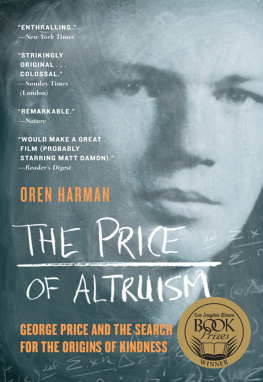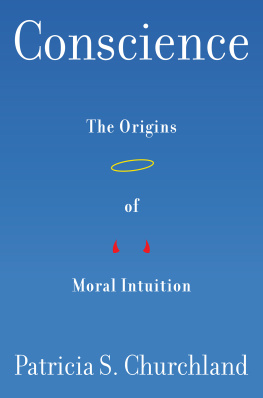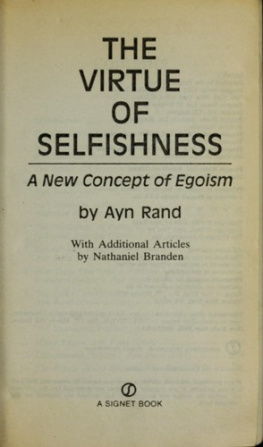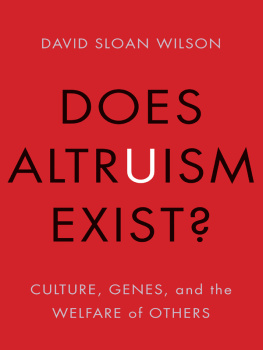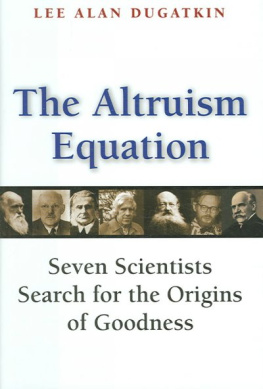MORAL
ORIGINS
ALSO BY CHRISTOPHER BOEHM
Hierarchy in the Forest
Blood Revenge
Montenegrin Social Organization and Values
MORAL
ORIGINS
THE EVOLUTION OF VIRTUE, ALTRUISM, AND SHAME
CHRISTOPHER BOEHM
BASIC BOOKS
A MEMBER OF THE PERSEUS BOOKS GROUP
NEW YORK
Copyright 2012 by Christopher Boehm
Published by Basic Books,
A Member of the Perseus Books Group
All rights reserved. Printed in the United States of America.
No part of this book may be reproduced in any manner whatsoever
without written permission except in the case of brief quotations embodied
in critical articles and reviews. For information, address Basic Books,
387 Park Avenue South, New York, NY 10016-8810.
Books published by Basic Books are available at special
discounts for bulk purchases in the United States by corporations,
institutions, and other organizations. For more information, please contact
the Special Markets Department at the Perseus Books Group, 2300 Chestnut
Street, Suite 200, Philadelphia, PA 19103, or call (800) 810-4145,
ext. 5000, or e-mail .
Designed by Linda Mark
Text set in 11 point Giovanni by the Perseus Books Group
Library of Congress Cataloging-in-Publication Data
Boehm, Christopher.
Moral origins : the evolution of virtue, altruism,
and shame / Christopher Boehm.
p. cm.
Includes bibliographical references and index.
ISBN 978-0-465-02919-8 (e-book)
1. Ethics, Evolutionary. 2. Virtue. 3. Altruism. 4. Shame. I. Title.
BJ1311.B645 2012
155.7--dc23
2011048896
10 9 8 7 6 5 4 3 2 1
This book is dedicated to
the memory of Donald T. Campbell
CONTENTS
A NATURAL-BORN HERESY
Queen Victorias England provided a most comfortable environment for Christians who loved to take their Bibles literally. Nature was perfect because in just seven days God had made nature perfect. Oceans and fish, predators and prey, all fit together like hands in gloves. And this perfectly tuned natural world was forever fixed and static because Jehovahs unlimited powers had made it that way.
Not only that, but the Old Testaments Adam and Eve were real, if uniquely special people whose divine Maker had created them quite recently. A methodical churchman had actually done the biblical math and concluded that just under six thousand years had elapsed since God had made Eve from Adams rib, installed this first pair of humans in His idyllic Garden of Eden, and then left them to their fate. In terms of evolutionary time, this meant that the origin of fallible human choice and our sinful sense of shametogether, these gave us a consciencehad taken place only yesterday or perhaps the day before. However, in the twenty-second year of the devout queens reign all of this was about to changeand for many there would be no turning back.
In 1859, Charles Darwins On the Origin of Species shook cultured reading publics in Great Britain and elsewhere like an irreverent clap of thunder. The initial Darwinian lightning bolt did not strike directly against the sacred moral origins story of Eve, Adam, and the persuasive serpent who seemed to undermine the good works of an otherwise omnipotent Jehovah. Rather, this new scientific thesis introduced to the physical world of animals and plants a theory of gradual but ever-changing transformations that were wholly naturalistic. As a result, the beautiful fit of species to their environments was no longer the work of God; indeed, the banal process of natural selection operated very much as livestock breeders did when with short-term practical objectives they changed the hereditary destinies of the animals they domesticated.
These breeders did their work in a deliberate fashion. They permitted more favorably endowed individuals to flourish, while denying less useful or less aesthetically pleasing individuals the opportunity to reproduce. Robert Darwin, a doctor and a country gentleman, was one of these animal breeders. His thoughtful sonwho as a young man seemed to be headed for the ministryknew that individuals of a domesticated species varied along many dimensions. Cattle varied in their productivity in giving milk; dogs, in their natural tendencies to point and fetch, their degree of docility, and the color of their coats.
Darwins official job had been to collect museum samples and to describe in minute detail the species of plants and animals on different continents, and all this hard work led, as we know, to a major theory. In his mind, such hereditary variation was something that a natural type of selection could act upon spontaneously: the individuals who were more fit to deal with their environments could reproduce, multiply, and flourish, while those who werent, couldnt. This singular insight was to change the Western worlds notions about nature and even its larger view of the universe.
This brings us to a profound difference between natural selection and the selection practiced by animal breeders. For Darwin, changeable natural environments were doing the mechanical work of triage, rather than as deliberate agents who knew what they were doing, and this meant that the perfection of nature was just one big accident. The specter loomed of a scary world, devoid of any ultimate Purpose, that suddenly lacked a protective, omniscient, and omnipotent God whose comforting role it was to help those who faithfully prayed for His assistance.
After the passage of a century and a half, its remarkable for any major theory not to be superseded, or at least vastly modified. However, in its basics this blind, mechanical theory of natural selection is still going strong in the world of science. If we add genes to what Darwin thought of rather intuitively as hereditary variation, the idea of natural environments favoring some variants and selecting against others works just as well in the early twenty-first century as it did in the mid-nineteenth. When we consider the complexities of life processes, the simplicity and explanatory power of the theory are awesome.
INDIVIDUAL COMPETITION DID THE TRICK
As the title tells us, On the Origin of Species was about how species come into being naturallythat is, without any supernatural help. To illustrate Darwins thinking, lets consider a hypothetical. If a primitive bear species had been distributed originally over a restricted, uniform part of North America and then portions of this population began to migrate into adjacent areas, as their gene pools became separated, these bear subpopulations might gradually begin to differ because they were coping with different climates or new food sourcesuntil eventually some of them could no longer interbreed. The result might be something like what we have today: black bears, brown bears (including grizzlies), and polar bears.
Darwins real-life examples of speciation were taken from all manner of animals and plants, large and small, and in the absence of DNA analysis his scientific stories about the selection pressures that shaped these organisms rang of impeccable logic and sound scholarship. In modern terms, what Darwins theory told the world was that potentially changeable natural environments were acting continuously on variation in the gene pools of resident populations. And for this process to do its work, two conditions were needed mechanically: hereditary variation and finite life spans among individuals. The latter was necessary if gene pools were to be modified over generations, for the less fit had to fade away and be replaced if local populations were to evolve to resemble their fittest members.
A special insight about the breeding potential of animals guided Darwins theorizing. He founded his entire theory of natural selection on one simple but staggering mathematical realization of late-eighteenth-century English political economist and demographer the Reverend Thomas Robert Malthus: even though Darwins theory was more subtle than that.


